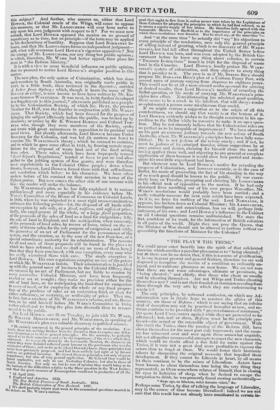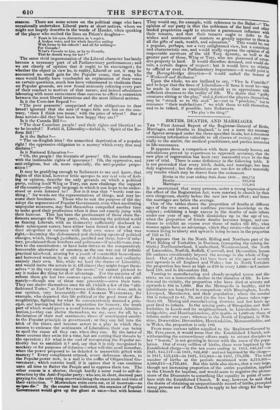"THE PLAY'S TI1E THING."
WE could never enter heartily into the spirit of that celebrated doctrine Nvhich ascribes a peculiar pleasantness to "being cheated ;" but as there can be no doubt that, it' this is a source of gratification, it is one in great present and general fruition, therefore we are well disposed to recognize the merits of a condition so ordinarily en- joyed, and to cultivate pleasures so near home. We are not sure that there are not some advantages, ultimate or proximate, in " being cheated ;" and chiefly, that those who cheat us usually end by cheating themselves. Are not Whigs and Tories cheating themselves now ? and is not their fraudulent dominion receding from them through the very arts by which they are endeavouring to retain it ?
The only principles, by universal confession, on which any Ad- ministration can in future hope to conduct the affitirs of' this country, are those of lhfurm : which is not saying that an infinite deal of deception may not be practised hereafter as now, and re- tbrins continue to be provided with " greeter chances of resistance," (to quote Lord CROTellETTY again,) while they are pretended to be advanced ; but, real or sham, 1k form must be the principle pro- fessed—the actual or the ostensible object of government. With this truth the Tories, since the passing of the Relbrin Bill, have shown themselves i'or the most part duly impressed; and the coun- try has witnessed over and over again those somewhat ungainly, but not altogether unsuccessful attempts to enact the new character, which would DO doubt afford a fine field fig satire against the Tories, if it were not a great deal more profitable to improve the actors than to laugh at them. We would foster their histrionic talents by sharpening the original necessity that impelled their development. If they cannot be Liberals at heart, by all means let them continue to be the mimes of Liberalism. Actors have been known to cheat themselves into being the very thing they represented; as OVID somewhere relates of himself, that in closing his eyes in imitation of sleep, when he desired to escape the temptation to drink, he was presently found snoring authentically.— " Siepe ego, nc biberem, volui dormire videri," &c.
Perhaps some Tories, by dint of talking the language of Liberality, may in the course of time become liberalized: indeed we are not sure that this result has not already been manifested in certain in-
stances. There are some actors on the political stage who have occasionally undertaken Liberal parts at short notices, whom we might not inaptly describe in the words of Hamlet, when speaking of the player who recited the lines on Priam's daughter- " Tears in his eyes, distraction in 's aspect,
A broken voice, and his whole function suiting With forms to his cohceit and all for nothing— For Canada!
What's Canada to him, or be to Canada,
That he should weep for her ? "
The same vivid impersonation of the Liberal character has lately become a necessary part of all Parliamentary performances ; and we are clearly of opinion that it ought to be encouraged ; for 'whether the object in view be, in reality, Liberal or not, it may be accounted no small gain for the Popular cause, that men, who once would hardly have vouchsafed an explanation of their votes on certain questions, much less have volunteered to vindicate them on Popular grounds, are now found anxiously referring every part of their conduct to motives of that nature, and indeed oftentimes labouring with more earnestness than success to effect a connexion between the most liberal intentions and the most illiberal actions. Is it the Corn-law Repeal ?—
" The poor peasants! unapprized of their obligations to dear bread! ignorant that the rate of wages falls not, but on the con- trary, rises I think you mean,' with the price of wheat ! Sua si bona aoriat—did they but know how happy they are!"
Is it the Canada Bill ?— " The dear Canadian people! and their rights and liberties! so to be invaded! Forbid it, Liberality—forbid it, Spirit of the Re- form Bill ! "
Is it the Ballot ?— " The un-English idea! the unmerited deprivation of a popular right the oppressive obligation to a secrecy which every free soul disdains!"
Is it National Education ?—
" Oh, the people ! the tbuntain of power! Oh, the interference with the inahenable rights of ignorance ! Oh, the oppressive, and anti-religious, but oh, more especially, the anti-popular propo- sition! "
It may be gratifying enough to Reformers to see and know, that flights of this kind, however little apropos to any real vein of feel- ing or opinion, describe the only grounds on which a political party, calling itself Whig or Tory, can now challenge the support of the country—the only language in which it can hope to be under- stood or even listened to ! Nor is it true that "words cost no- thing ; " for words are the representatives of things, and may be- come their bondsmen. Those who to suit the purpose of the day adopt the arguments of Popular Government, even when meditating unpopular measures, may find themselves compelled another time to make good their professions when it does not exactly jump with their humour. This has been the predicament of those sham Re- formers amongst the Whig party, who, entering the political world as flaming Liberals, with an insincerity sufficiently disclosed by their subsequent career, have either been forced on a line of con- duct altogether at variance with their own sense of what was right,—becoming the dishonoured and shrinking agents of political changes, which, though justitiable, justified not them, but—if salu- tary, proclaimed them botehers and poltroons—if mischievous, trai- tors to the constitution ; or have been driven to the comparatively honourable alternative of apostasy, as the one way out of infinite practical falsehood, atoning for a youth of counterfeit benevolence and borrowed wisdom by an old age of doltishness and malignity entirely their own. But, while we laud the drama of Liberality, and would incite the actors in it, till almost they might forget them- selves" in thq very cunning of the scene," we cannot pretend to say it makes ahly thing for their advantage. For the enemies of all reform there are but two courses open, neither of which can ulti- Inately—though one of them may presently—serve their turn. They can shelve themselves once for all, (which a few of the "old- fashioned Tories," as Earl STANHOPE calls them, /wee done, and, in our opinion, very honourably—Sir CHARLES WETHERELL, for example, who departed this life political at the good town of Bo- roughbridge, fighting for what he conscientiously deemed a prin- ciple, and leaving behind him a reputation for honesty, the tenth part of which would prove a moral fortune to the present Adminis- tration,)—they can shelve themselves, we say, once for all, by a declaration of their real sentiments, those of unmitigated enmity to the Popular principle in government ; or they can fall into the trick of the times, and become actors in a play in which they assume to embrace the sentiments of Liberalism, their cue being to spoil the cause all they can, when they can. By the latter of these courses they swim for a time, but are cutting their throats by the operation ; for what is the end of recognizing the Popular au- thority but to establish it ? and, say that it is only recognized in mockery or for purposes of delusion—what will this avail hereafter, when the power proposed to be deluded is meanwhile gifted with mastery ? Every compliment uttered, every deference shown, to the Popular power now, is a nail in the coffin of Oligarchical Go- vernment; which outwits itself, if it opines that it can continue unto all time to flatter the People and to oppress them too. The other course is a shorter, though hardly a surer road to self-de- struction by the Anti-Popular party; who are, in short, doomed past praying for, the only thing uncertain being the exact mode and time of their extinction. " Moriendum enim certe eat, et id incertum—an eo ipso die." By the course last indicated, the enemies of Popular Government would give up the ghost at once—but with honour. They would say, for example, with reference to the Ballot-44 The opinion of our party is that the noblemen of the land and other landed proprietors ought to exercise a paramount influence with their tenants, and that their tenants ought to defer to the wishes and sentiments of masters so greatly superior to them in all the gifts of rank, wealth, and education?' This would be, not a popular, perhaps, nor a very enlightened view, but a consistent and characteristic one, and would really express the opinion of all respectable survivers of the old Tory dynasty, as well as the greater part of those, Whig or Tory, who are possessed of exten- sive property in land. It would therefore demand, and would ob- tain, a certain degree of respect : but it would have no relation to official or even to Parliamentary importance—it would point in the Boroughbridge direction—it would unfurl the banner of " Wetherell and Seclusion."
Upon the whole, we are inclined to cry, "Vive la Comedie!" and to hope that the farce of Liberalism—it' farce it must he—may be made in time so exquisitely natural as to approximate with sufficient closeness to the reality of life. We desire that "guilty creatures sitting at the play," and d fortiori the players themselves, may be "struck so to the soul" as—not to " proclaim," but to renounce "their malefactions :" we wish them to talk themselves, and to be talked, if possible, into Reformers.
" The play 's the thing !"



























 Previous page
Previous page